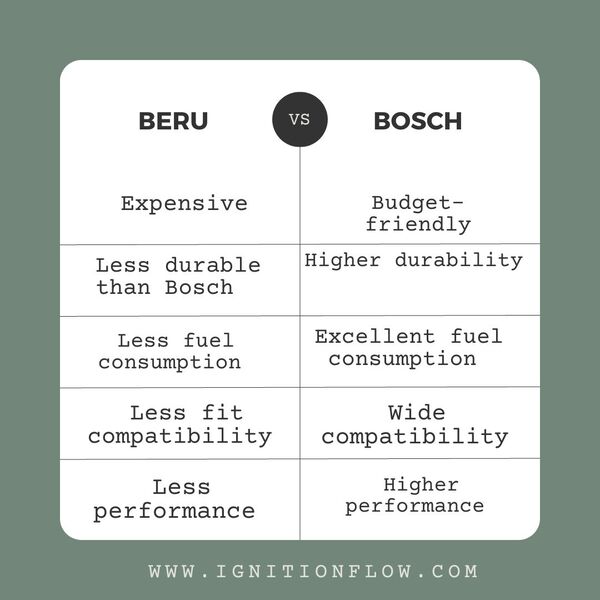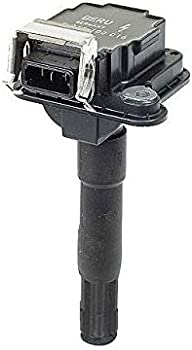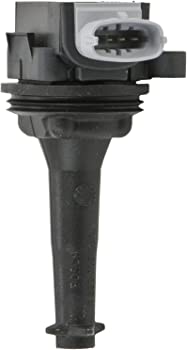Both Beru and Bosch are well-known brands and globally renowned as they make very good ignition coils. We will get straight to the topic without any delay and hopefully help you select a perfect ignition coil for your car.
From what I’ve seen, Beru ignition coils are often made out of copper wire and take the form of a “pencil” or “stick,” putting them in closer proximity to the spark plug to enhance ignition performance and lessen the likelihood of misfires.
You’ll have to spend more money on them, but you’ll have an easier time tracking down the correct component because they’re designed specifically for your make and model of car.
However, Bosch ignition coils tend to use aluminum wire and feature a more conventional “block” or “cassette” shape, which may be less efficient due to being further away from the spark plug.
On the other hand, they tend to be less expensive and are sometimes better suited to older or more unusual automobiles.
| Name | Image | Price |
|---|---|---|
| Beru Ignition Coil |  | $$ |
| Bosch Ignition Coil |  | $$ |
In the end, you and your vehicle’s specifications will determine which ignition coil is best for you. But let’s deep dive as I share my experience of using both of these ignition coils, which hopefully makes things easier for you if you are in confusion.
Beru vs. Bosch Ignition Coil In a Table

Beru Ignition Coil Overview

BERU Ignition Coils are designed, tested, and manufactured to meet Original Equipment Manufacturer (OE) specifications and quality standards by BorgWarner in Western Europe, Asia, and Mexico. BERU is able to provide a comprehensive selection of ignition technologies for gasoline-powered vehicles.
Pros :
- BERU ignition coils are being fine-tuned for use in today’s spark-ignition engines, which have specific needs due to factors such as turbocharging, downsizing, direct injection, low exhaust gas recirculation rates, etc.
- As far as I am concerned, Beru ignition coils are very dependable, which guarantees a quick engine start and a long service life.
- Despite harsh conditions and loads, I have used it numerous times, and these coils have maintained a constant output.
- Beru produces ignition coils for a variety of car models.
- The energy output and other properties of these coils can be tailored to the user’s needs.
- It is possible to customize these coils based on specific parameters, such as energy output. So I really enjoy this feature, and many of you will enjoy it as well.
Cons:
- Ignition coils manufactured by Beru are, on average, more expensive than those manufactured by competing brands, making them less accessible to consumers who are operating with a limited spending capacity.
- These coils might come with a limited guarantee, but they might not be as comprehensive as the warranties that come with certain other manufacturers of coils.
- Because Beru ignition coils may not be as commonly available as those of some other brands, it may be challenging to locate them in some regions.
Bosch Ignition Coil Overview

The Bosch company, based in Germany, produces a variety of ignition coils for use in automobiles; these coils are known as Bosch ignition coils.
Pros:
- With Bosch ignition coils, I have always experienced trouble-free engine starts and efficient operation over a long period of time.
- No matter how heavy the load or how harsh the conditions are, the coil’s output remains constant.
- There is a wide range of compatibility between Bosch ignition coils and a variety of car models.
- With their easy installation, Bosch ignition coils are popular among various people, including me, as I like to install them myself.
- Another awesome feature is ignition coils from Bosch are among the most affordable and cost-effective options available.
Cons:
- Since I have used Bosch ignition coils for a long time, I have no complaints, but their relatively low energy output may not be the best choice for high-performance vehicles.
- There isn’t a lot of room for personalization in these coils, as I wasn’t able to tweak things like energy output or other settings.
Beru vs. Bosch Ignition Coil: Major Differences
Beru ignition coils are typically made using copper wire, which provides excellent conductivity and heat resistance. In contrast, Bosch ignition coils often use aluminum wire, which is less expensive but may not be as durable as copper.
Beru ignition coils often use a “pencil” or “stick” design, which places the coil close to the spark plug. Reports suggest this can improve ignition performance and reduce the risk of misfires – so cool, right?
Bosch ignition coils may have a more traditional “block” or “cassette” design which is not bad, but Beru is more effective according to this logic.
As a result of their “pencil” or “stick” shape, Beru ignition coils are able to boost ignition performance and decrease misfires. Beru ignition coils have a more efficient design that reduces the distance an electrical signal must travel.
Bosch ignition coils, on the other hand, may not be as effective because they are located farther from the spark plug.
Depending on the model and application, Beru ignition coils may cost more than Bosch. Beru ignition coils are often more expensive due to their specialization and application. Bosch ignition coils may be cheaper in general. This is an important factor as you might not want to spend a lot.
Beru ignition coils are generally made for certain automobile models, making it easy to find the right part. This can help you find a vehicle-specific ignition coil.
Bosch ignition coils may be more compatible with older or rare vehicles. I use the Bosch ignition coil in my BMW car, and I had a great experience with it.
Conclusion
Beru and Bosch’s ignition coils both offer reliable performance, but the Bosch coil is the better choice if you’re looking for an upgrade. Even bosch is a renowned brand in the ignition coil market.
We extensively review Bosch articles in comparison to other popular brands. Our most recent comparison is of the NGK and Bosch Ignition Coil, so you can see which one is more reliable.
Comparing the Delphi and Bosch Ignition Coils, one can determine which is most suitable for specific engine types.
This evaluation of the Denso vs. Bosch Ignition Coils will provide an in-depth comparison of the two, determining which one is best suited for installation.
